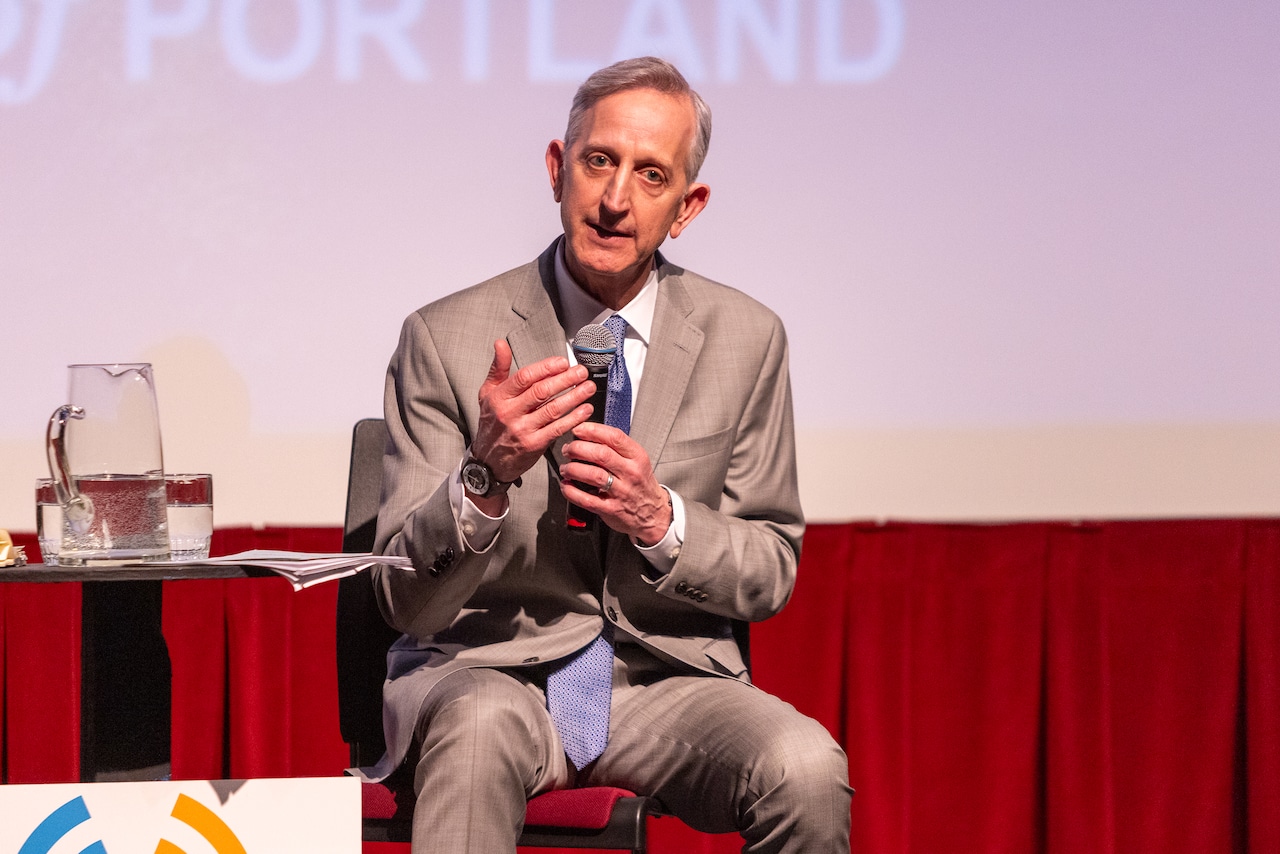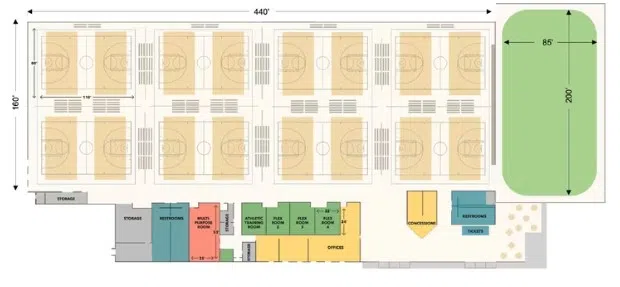Portland Mayor Keith Wilson unveiled a proposed $8.5 billion budget Monday that would hike numerous city fees and slash municipal jobs while also preserving and even boosting basic services centered around public safety and livability.
Under Wilson’s proposal, residents would see the cost of parking meters, neighborhood leaf removal, recreation fees and other city service surcharges all climb and positions within parks, water, permitting and city administration shrink, documents show.
At the same time, the budget for next fiscal year — which begins July 1 — would seek to increase funding for police and its unarmed alternative Portland Street Response, which responds to mental health crises. It would more than double the number of city homeless outreach workers. And it would pour more money into filling potholes, removing graffiti and impounding derelict RVs.
Officials on Monday also said the city had secured $24.9 million from Metro and the state to help fund Wilson’s plan to open 1,500 new shelter beds, a centerpiece of the mayor’s pledge to end unsheltered homelessness by December.
In addition, according to Wilson’s proposal, the city would spend about $40 million next year to continue running eight “temporary” shelters serving more than 800 people at a time and fund 50 beds for homeless people in need of addiction recovery services.
“The task before us requires a city government dedicated to rebuilding trust with the public and proving we can deliver purpose and impact with every dollar we spend,” Wilson said in a letter accompanying his first proposed budget as Portland’s mayor.
The release of Wilson’s proposal comes as the city has faced a combined shortfall of more than $150 million between its general fund — which primarily supports police, fire, parks and homeless services — and reductions to other core municipal services such as transportation, permitting and water and sewers.
Portland officials have warned for months that sluggish property and business tax revenues, coupled with rising city expenses and the end of one-time funding sources such as federal pandemic relief dollars squeezed city coffers.
“We’re now experiencing the consequences of a tax base impacted by declining commercial real estate in our urban core, fewer businesses and new arrivals and economic policies that have too often taken job growth for granted,” Wilson said. “I have explored every avenue to blunt the impact of the coming budget reductions.”
That includes a proposed 60-cent-an-hour parking meter increase, a 10% hike in Portland Parks & Recreation fees — from swim lessons to event permits — and increases on other surcharges ranging from those imposed on rideshare companies to property owners who offer short-term rentals like Airbnb.
Each proposed city fee increase requires approval from the 12-member Portland City Council, which will hold a public hearing on the mayor’s proposed budget Wednesday before voting on it later this month.
Wilson was clear that he would not support any effort to divert money from the city’s lucrative clean energy fund to bolster core city services or increase the tax imposed on large retailers to finance it, as several council members have proposed.
“Our voters remember the promises made with this fund — a cleaner, greener, more equitable, lower-carbon Portland,” he said during a press briefing Monday. “If we want our peer cities to follow our path, we must lead by example.”
All told, Wilson will recommend the city spend $804 million, a 9% increase from the current $732 million, in discretionary funds, which comprise the bulk of the city’s general fund, documents show.
While the mayor’s proposed budget spares community centers, youth sports and after school programs from the chopping block, it also aims to slash maintenance, bathroom cleaning, trash cleanup and landscaping at city parks.
In addition, the city’s workforce would shrink to 7,241 under Wilson’s proposal, down from about 7,323 authorized employees currently.
Portland Permitting & Development, which has seen revenues plummet amid the city’s housing construction slump, would face a 51-person cut. The Portland Water Bureau would slash about 32 positions while Portland Parks & Recreation would eliminate 15.
Meanwhile, budget documents show, Wilson would seek to reduce 56 jobs across areas such as communications, equity and procurement as part of a multi-year effort to reduce administrative costs in those areas by 20%.
“We are no longer in a position where we can cushion ineffectiveness with excess funding,” Wilson said.
As members of the City Council digest the mayor’s proposed budget, some are already experiencing heartburn. In a statement, Councilor Steve Novick raised concerns over the proposed cuts to park maintenance and Wilson’s reliance on outside funding that may not be available in years to come.
“These factors lead me to the conclusion that the council needs to look for additional sources of revenue – in order to limit the cuts to parks, to limit the property tax increase we might pursue for parks, and to avoid another deficit next year,” Novick said.
— Shane Dixon Kavanaugh covers Portland city government and politics, with a focus on accountability and watchdog reporting.
Reach him at 503-294-7632
Email at skavanaugh@oregonian.com
Follow on X @shanedkavanaugh or on BlueSky @shanedkavanaugh
Our journalism needs your support. Subscribe today to OregonLive.com.
































































